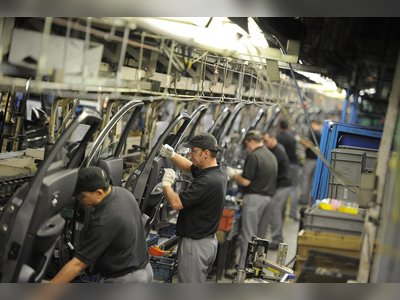An Insight into Irregular Arrival
A firsthand account of a recent migrant's journey and life after arrival in the UK reveals complexities surrounding immigration enforcement and support.
In recent weeks, a 29-year-old man from an undisclosed country described his journey to the UK via an inflatable boat, illustrating an emerging narrative surrounding irregular migration across the English Channel.
The individual recounted the challenges he faced when attempting to fly into the UK, mentioning his unsuccessful attempt to board an EasyJet flight due to immigration requirements for documentation.
Consequently, he opted for an alternative route, paying £1,800 to a smuggler for access to a boat crossing.
The crossing, he noted, was relatively smooth, and upon landing, he was welcomed by authorities who provided clothing and basic necessities.
The man described the accommodations as satisfactory, noting that he was placed in a four-star hotel that facilitated access to food, medical care, and recreational activities, such as table tennis.
Statistics indicate that small boats have increasingly become a prevalent means of entry for migrants seeking asylum in the UK.
The government has reported a rising number of individuals attempting this perilous journey, with thousands making crossings in recent months.
Migrants arriving in the UK are processed by local authorities within a framework intended to manage the influx of new arrivals.
They often receive initial support, which includes temporary accommodation and healthcare.
The man expressed ambivalence about his current situation, mentioning his intention not to seek formal approval for residency.
He foresaw that gaining legal status would lead to more responsibilities, such as employment and tax obligations.
The individual also touched upon the informal economy, stating that he was able to find work through informal channels, which he viewed as straightforward.
He acknowledged the complexities surrounding employment regulations for migrants and how his current circumstances allowed for a certain level of financial independence without the formalities often required by law.
Additionally, he shared plans for his future, indicating an intention to remain in the UK until faced with deportation.
He described a scheme wherein departing migrants could receive a financial settlement, which he believed he could utilize for leisure in France after what he referred to as his 'clean slate' endeavor in the UK.
The experiences shared highlight increasing concerns around the UK's immigration policies and the support systems in place for those arriving irregularly, as well as the socio-economic factors influencing these individuals as they navigate life in a new country.
The individual recounted the challenges he faced when attempting to fly into the UK, mentioning his unsuccessful attempt to board an EasyJet flight due to immigration requirements for documentation.
Consequently, he opted for an alternative route, paying £1,800 to a smuggler for access to a boat crossing.
The crossing, he noted, was relatively smooth, and upon landing, he was welcomed by authorities who provided clothing and basic necessities.
The man described the accommodations as satisfactory, noting that he was placed in a four-star hotel that facilitated access to food, medical care, and recreational activities, such as table tennis.
Statistics indicate that small boats have increasingly become a prevalent means of entry for migrants seeking asylum in the UK.
The government has reported a rising number of individuals attempting this perilous journey, with thousands making crossings in recent months.
Migrants arriving in the UK are processed by local authorities within a framework intended to manage the influx of new arrivals.
They often receive initial support, which includes temporary accommodation and healthcare.
The man expressed ambivalence about his current situation, mentioning his intention not to seek formal approval for residency.
He foresaw that gaining legal status would lead to more responsibilities, such as employment and tax obligations.
The individual also touched upon the informal economy, stating that he was able to find work through informal channels, which he viewed as straightforward.
He acknowledged the complexities surrounding employment regulations for migrants and how his current circumstances allowed for a certain level of financial independence without the formalities often required by law.
Additionally, he shared plans for his future, indicating an intention to remain in the UK until faced with deportation.
He described a scheme wherein departing migrants could receive a financial settlement, which he believed he could utilize for leisure in France after what he referred to as his 'clean slate' endeavor in the UK.
The experiences shared highlight increasing concerns around the UK's immigration policies and the support systems in place for those arriving irregularly, as well as the socio-economic factors influencing these individuals as they navigate life in a new country.










